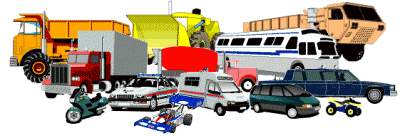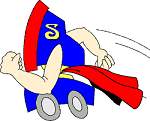
Computers are showing up everywhere you
look, and even in places you can't see. Computers check out your groceries, pump
your gas, dispense money at the ATM, turn the heat on and off, control the way
your car runs. They're everywhere! They're everywhere!
In fact, the computer is rapidly becoming, as tightly woven into the fabric of
our lives as the automobile.
When automobiles were new, many people said "Those smelly, loud, complicated things will never replace the horse!" And "Those things break down in just a few miles, while my faithful horse goes on and on and repairs itself!" Nowadays it's hard to imagine the world without all the variety of four-wheeled, internal combustion vehicles. How many can you name? Sedans, pickup trucks, fire engines, front-end loaders, 4-wheelers, golf carts, bulldozers, cranes, vans, dump trucks... We have an "automobile" for every purpose under heaven - and in different models and colors, too.

So it is with computers. There are different kinds of computers for different purposes. They are just as varied in size, expense, and ability as our more familiar 4-wheeled vehicles are.
A computer is an electronic device that executes the instructions in a program. A computer has four functions:
| a. accepts data |
Input |
| b. processes data |
Processing |
| c. produces output |
Output |
| d. stores results |
Storage |
|
Hardware |
the physical parts of the computer. |
|
Software |
the programs (instructions) that tell the computer what to do |
|
Data |
individual facts like first name, price, quantity ordered |
|
Information |
data which has been massaged into a useful form, like a complete mailing address |
 |
Speed | A computer can do billions of actions per second. |
 |
Reliability | Failures are usually due to human error, one way or another. (Blush for us all!) |
 |
Storage | A computer can keep huge amounts of data. |
Now you are ready to go to the next lesson!!